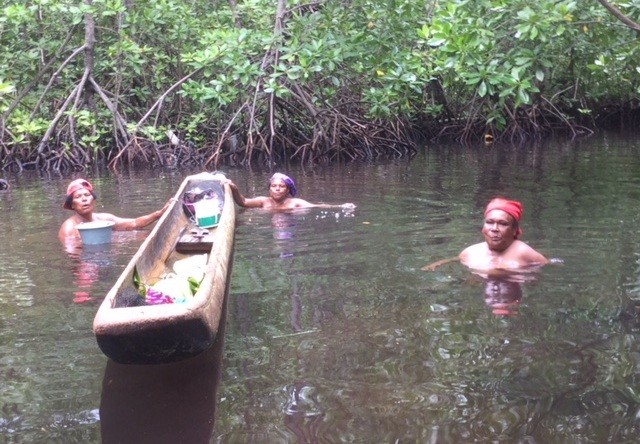Popular Reads
Top Results
Can't find what you're looking for?
View all search resultsPopular Reads
Top Results
Can't find what you're looking for?
View all search resultsPapuans celebrate womanhood in mangrove forest
Change text size
Gift Premium Articles
to Anyone
 Papuan women of Enggros village in Jayapura, Papua, swim in a mangrove forest, which locals call the tonotwiyat (female forest), to collect clams, on Friday. Men are not allowed to enter the forest when women are collecting clams. (JP/Nethy Dharma Somba) (female forest), to collect clams, on Friday. Men are not allowed to enter the forest when women are collecting clams. (JP/Nethy Dharma Somba)
Papuan women of Enggros village in Jayapura, Papua, swim in a mangrove forest, which locals call the tonotwiyat (female forest), to collect clams, on Friday. Men are not allowed to enter the forest when women are collecting clams. (JP/Nethy Dharma Somba) (female forest), to collect clams, on Friday. Men are not allowed to enter the forest when women are collecting clams. (JP/Nethy Dharma Somba)
T
hree Papuan women, Nela Hababuk, 58, Maria Meraudje, 62, and Agustina Iwo, 45, shared laughter while roaming around mangrove forests in Kampung Enggros, Jayapura, Papua, looking for clams on Friday.
They held onto a kole-kole (floating boat), where they put their lunchboxes and clams for the day. At times, they lifted their muddy legs to the surface hoping they could find clams there. They would clean the clams they found and collect them in the kole-kole. The clams would then be sold at the traditional market. Collecting and selling clams has been acknowledged as the ‘women’s job’ and has become the locals’ main source of daily income, especially during times of the year when the men cannot sail out to sea to fish.
“We often spend the whole day in the forest, that’s why we have our lunchboxes with us. After lunch, we will continue looking for clams until dawn,” Maria told The Jakarta Post.
Collecting clams in the forest is special for local women. Before the women leave to collect clams, they huddle up and pledge to never leave each other’s side while in the forest, as they are supposed to travel in a group. Men are banned from entering the forests while the women are collecting clams.
“It has been our preserved tradition. Males are banned because the women usually go naked when collecting clams — it feels more comfortable that way anyway,” she said.
Spending time with other women, they will share funny stories and laugh, sing together and even freely shout out their inner voices.
“We feel free to do anything we want. We are happiest when we’re in the forests. Men who hear our voices will know and they will go further away from the forests,” Maria said.
Read also: Jawatan Benculuk, an enchanting forest in the outskirts of Banyuwangi
Men who break the rule will be sanctioned by local traditional law, or hukum adat, and will have to pay a fine. The women-only rule also applies to outsiders, including journalists hoping to capture their activities in the forest.
Men are only allowed to enter the forest to collect wood when there are no women, deemed to be the rightful authority of the forest. Enggros Kampung leader Origenes Meraudje said women were free to do anything they wanted in the forest because, “they don’t have a place to hang out and share stories in the village.”
He boasted of the forest as the pride of the kampung, claiming that it is probably the only mangrove forest in Indonesia designated for women.
The 8-hectare mangrove forest, which locals call the tonotwiyat (female forest), is located in the eastern part of Kampung Enggros, the oldest kampung in Jayapura. It takes only five minutes by boat from the kampung to get to the forest.
Echy Sanyi, an Enggros native, who works as a journalist, recalled her fond memories as a young girl following her grandmother into the forest. Echy remembered being lectured by her because she could not row the boat. “You shouldn’t spend too much time in the city. Come home and learn how to row the boat!” Echy’s grandmother would say as she recalled.
However, local women are now facing challenges from mounting trash, particularly plastic, coming from the city.
“We find more plastic than clams nowadays. We are so sad,” Meraudje said.
“Back in the day, we needed only half a day to fill up our boat [with clams]. But these days, we work the whole day but barely fill up half the boat,” she added.










